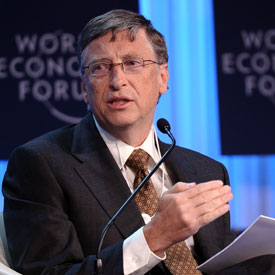Opening the Gates: new funds to combat killer diseases
Microsoft boss Bill Gates pledges a multi-million pound donation to the Global Fund to fight Aids, TB and malaria – but his philanthropy means far more than just immediate cash.

“These are tough economic times, but that’s no excuse for cutting aid to the world’s poorest,” Bill Gates told the World Economic Forum in Davos – as he threw a multi-million dollar lifeline to the battle against three of the world’s deadliest diseases.
The $750m from the Bill and Melinda Gates Foundation, is also aimed at encouraging other donors to back the Global Fund to fight Aids, tuberculosis and malaria, which has been through a rocky few months.
The fund was forced to cancel $1bn in new spending last year – after allegations of corruption and poor financial monitoring were highlighted by the Associated Press.
But now Mr Gates has said he wanted to lend it some credibility, and reassure other potential benefactors. He pointed to the significant work the fund had done to help “change the fortunes of many of the world’s poor through its prevention and treatment programs among 150 countries.”
These are tough economic times, but that’s no excuse for cutting aid to the world’s poorest. Bill Gates
And it’s here that the influence of the Gates’ philanthropy can best be seen, not just to provide vital funds for projects working to combat poverty and ill health in the developing world, but to set the agenda for other donors, even governments, to follow.
Getting and spending
One institution to benefit from Gates Foundation funds is the Abdul Latif Jameel Poverty Action Lab at the Massachusetts Institute of Technology, which works to combat poverty by making sure that policy solutions are based on sound, scientific evidence.
J-PAL’s global director, Rachel Glennerster, flew to Seattle to meet Raj Shah, then head of agriculture development at the Gates Foundation, who brought his team along to prepare a joint proposal. The foundation was interested in J-PAL’s work on new technologies in agriculture, which would help them understand how best to promote the take-up of innovations that could prove hugely beneficial.
Ms Glennerster told Channel 4 News that getting the money was a pretty long and rigorous process: once a joint proposal had been drawn up, it was sent out for peer review, so outside experts in the field could comment on the ideas. Once other parts of the foundation had also chipped in, there were more discussions to come up with the right objective, and then to work out how much money they would need to achieve it.
Follow the money
In the end, J-PAL received just over $4.5m over six years: getting funding from the Gates family meant they were able to set up the new research initiative, and then they also encouraged other donors to join in.
Rachel Glennerster said the real influence of the Gates Foundation wasn’t so much the actual amount of cash that it hands out – though considerable – it’s relatively small compared to government aid and development budgets.
The bigger influence is shaping the way governments give their funding, and the priorities they choose. Rachel Glennerster, J-PAL
“Gates, in particular, has been incredibly influential in helping to set the agenda,” she said.
They’ve been one of the chief advocates of basing philanthropy on the most cost-effective, proven solutions, which has had a huge impact on other major donors and government agencies.
“They have advocated among other rich investors to give money, but the bigger influence is shaping the way governments then give their funding, the priorities they choose, and how they focus on innovation,” she told Channel 4 News.
Setting the agenda
To take one example, the Gates Foundation has been instrumental in funding the incentive scheme which fuelled the development of new vaccines for killer diseases – and that’s made it possible for government money to be spent on buying up those treatments, and distributing them to the millions who need them.
So the latest $750m donation to the Global Fund will undoubtedly have a dramatic impact in its own right – but the influence of Bill Gates, philanthropist, is the gift that really does keep on giving.
Felicity Spector writes about US affairs for Channel 4 News.
-
Latest news
-
Fans react to football clubs increasing season ticket prices4m

-
‘We’re still a long way from justice’, says infected blood scandal victim5m

-
Infected blood scandal: Victims set to receive billions of government compensation7m

-
Iran’s president and foreign minister missing after helicopter crash3m

-
Yungblud launches his own affordable music festival5m

-




